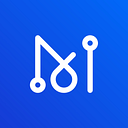Advancements of Intelligent Contract Version 2
The recent advancements in the Intelligent Contract platform represent a significant evolution from the previous iteration, with substantial improvements in functionality, accessibility, and application. These changes underscore the platform’s growing capability to meet the dynamic needs of blockchain application development.
Enhanced Functionality through Natural Language Processing
The latest iteration of the Intelligent Contract platform showcases a significant leap in bridging the gap between natural language and Solidity code. Previously, the models primarily focused on training with existing open-source contracts or organized mainstream contracts into a vector knowledge base. The current version builds on this by not only converting natural language specifications directly into modular smart contracts but also enabling personalized rewriting of standardized smart contract modules. This marks a considerable improvement by allowing users to input their contract specifications in everyday language, drastically simplifying the process and making it more accessible to non-programmers. This direct approach is more intuitive compared to the earlier method that relied heavily on the structure provided by the existing data.
Comprehensive Support for Mainstream Contract Languages
Whereas the previous models supported a variety of Ethereum-based contract standards such as ERC20, ERC721, and others, the new updates emphasize enhancing this support by focusing on mainstream contract languages. The platform now not only supports these standards but also ensures that the generated contracts are robust, integrating best practices of contract development such as gas optimization and error handling. This comprehensive support is crucial as it extends the platform’s utility across a broader range of blockchain applications, from token issuance to complex non-fungible tokens (NFTs) and multi-token standards.
Customization and Flexibility
Another notable advancement is the platform’s enhanced ability to handle complex user-defined logic. The previous versions focused on breaking down complex tasks into simpler subtasks to improve model performance. However, the latest updates take a more holistic approach by allowing for personalized modifications and customizations of standardized modules based on specific user needs. This feature is particularly beneficial in diverse business scenarios where customization is often necessary to meet unique operational requirements.
Security and Reliability
Security has always been a paramount concern in smart contract development. The earlier versions integrated security checks within code segments to detect vulnerabilities. The current version continues to build on this foundational security feature by integrating advanced security analysis and vulnerability detection tools, ensuring that each contract generated is not only functional but secure from potential exploits.
In essence, the evolution of the Intelligent Contract platform from its previous versions to the current state represents a significant stride towards making blockchain technology more accessible, secure, and adaptable. By enhancing its natural language processing capabilities, broadening the scope of contract language support, and introducing advanced customization options, the platform is poised to cater to an even wider spectrum of developers and industries, ultimately facilitating a more robust adoption of blockchain technology. These improvements not only refine the user experience but also enhance the overall efficacy and security of the smart contracts generated, making the Intelligent Contract platform a formidable tool in the landscape of blockchain development.
Please stay tuned for the testing invitation.
The Matrix AI Network was founded in 2017. In 2023, we enter Matrix 3.0 blending neuroscience with our previous work to realize the vision of the Matrix films.
FOLLOW MATRIX:
Website | GitHub | Twitter | YouTube
Telegram (Official) | Telegram (Masternodes)
Owen Tao (CEO) | Steve Deng (Chief AI Scientist) | Eric Choy (CMTO)
